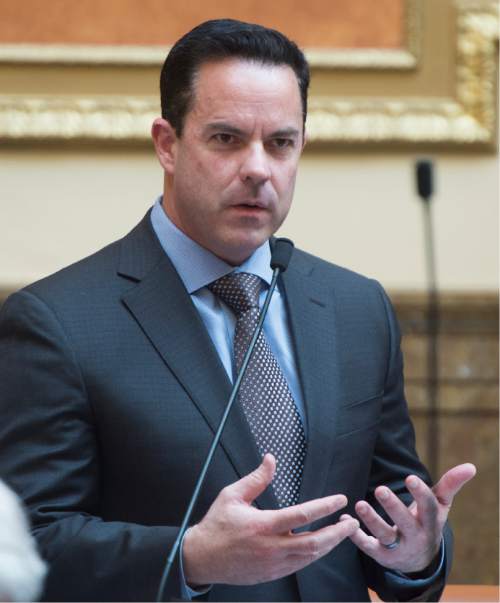This is an archived article that was published on sltrib.com in 2016, and information in the article may be outdated. It is provided only for personal research purposes and may not be reprinted.
Dale Petersen didn't expect to live to see his 70th birthday.
After retiring to St. George six years ago, Petersen bought a bike that he rode every day until he noticed about two years ago that he was getting winded on bike rides. Doctors found that mesothelioma, caused by years of exposure to asbestos when he was installing and removing residential boilers for Utah Power & Light, was attacking his lungs and would eventually take his life.
"This is just a terrible disease and it's going to take me at an early age," Petersen said. "It's been very, very hard on my family and my wife, especially. It's been tough."
Petersen marked his 70th birthday last week, and considered it "a blessing." He also visited his doctor to have fluid drained from his lungs so he would be well enough to travel to the Capitol this week to testify against a bill he says would make it harder for patients like him to sue over their asbestos-related ailments and likely mean many would die before they receive compensation.
"I can't imagine some of my working friends who may get it later on would have to go through a law like this," Petersen said. "I can't imagine. And it's all in the name of slowing things down for the patient."
Petersen is concerned about HB403, sponsored by Rep. Brad Wilson, R-Kaysville.
The bill would :
• Require plaintiffs to quantify the "dose" of their asbestos exposure, identify the source and establish that the exposure was "a substantial factor" in causing the disease;
• Identify the beginning and end dates of each alleged exposure and the manufacturer of the asbestos product in each exposure;
• File a declaration disclosing personal information including Social Security numbers and identifying any compensation the plaintiff may have received for prior claims;
• Allow companies named as defendants to file motions to delay proceedings in order to dispute the information in plaintiffs' declarations.
"It's not trying to slow the process down at all and if there's the perception that that's what the intention is, it's wrong," Wilson said. "I would not ever do that. These victims have been some victims of some bad stuff."
Wilson said some trial lawyers are going to court and suing various asbestos businesses for damages, then, after receiving that award, going back to the trusts and filing claims for damages from the bankrupt companies' trusts, draining the resources.
"It's meant to ensure, when the courts as well as the trusts are considering damages — which are due, we're not arguing that at all — that we look at all these things at the same time," he said. "Because, if we do double-dip, what happens is these trusts are going to get depleted fast and the victims down the road are not going to get their fair share."
Petersen's attorneys were able to file a lawsuit against the companies that sold and distributed the asbestos products to which Petersen was exposed. They were also able to file claims for compensation from trust funds set up by companies that have gone bankrupt in order to pay future victims, although the trust funds pay out meager amounts in the settlements.
"It's complicated trying to get full compensation for everyone knowing that we're going to get pennies on the dollar from" the trust funds, said Rick Nemeroff, Petersen's attorney. "We're doing the best we can to get as much as we can from the available resources."
They were able to push the lawsuit through the courts in about a year and speed is important for mesothelioma patients who typically are given between six and 18 months to live, said Nemeroff.
Petersen said the settlement — the amount of which he could not disclose — gives him peace of mind "that my wife and family will be OK after I'm gone."
"Anything that would slow a case down essentially would be a death sentence," said Nemeroff. "We were able to get this done really efficiently, which is the exact opposite of what the bill that is being proposed would do. It would be years and years before we would be able to get a case like Mr. Petersen's filed and set for a jury trial and it's almost an absolute certainty he would be dead before he got his day in court."
Portions of Wilson's bill are lifted from two pieces of model legislation promoted by the American Legislative Exchange Council, or ALEC, a business-backed group of conservative lawmakers.
Similar legislation has been proposed in California, Pennsylvania, South Carolina, Missouri, Indiana, New York and Tennessee, according to the Environmental Working Group, which has tracked asbestos legislation.
But Nemeroff says Wilson's bill goes further than any of those other bills has gone.
"This specific bill that is being proposed in Utah is the most egregious that I've seen and it's never been passed [in other states] in its current form," Nemeroff said.
Wilson said he is willing to work on revisions to his bill if they're needed. It is scheduled for a hearing before the House Business and Labor Committee Wednesday morning. Peterson said he plans to be there.
"I plan to fight as best I can for my fellow men who may come down with this disease. It's a terrible disease. It works on you every day. There's a lot of heartache with it. I can't tell you how it works on you and your family," Petersen said.
Twitter: @RobertGehrke



